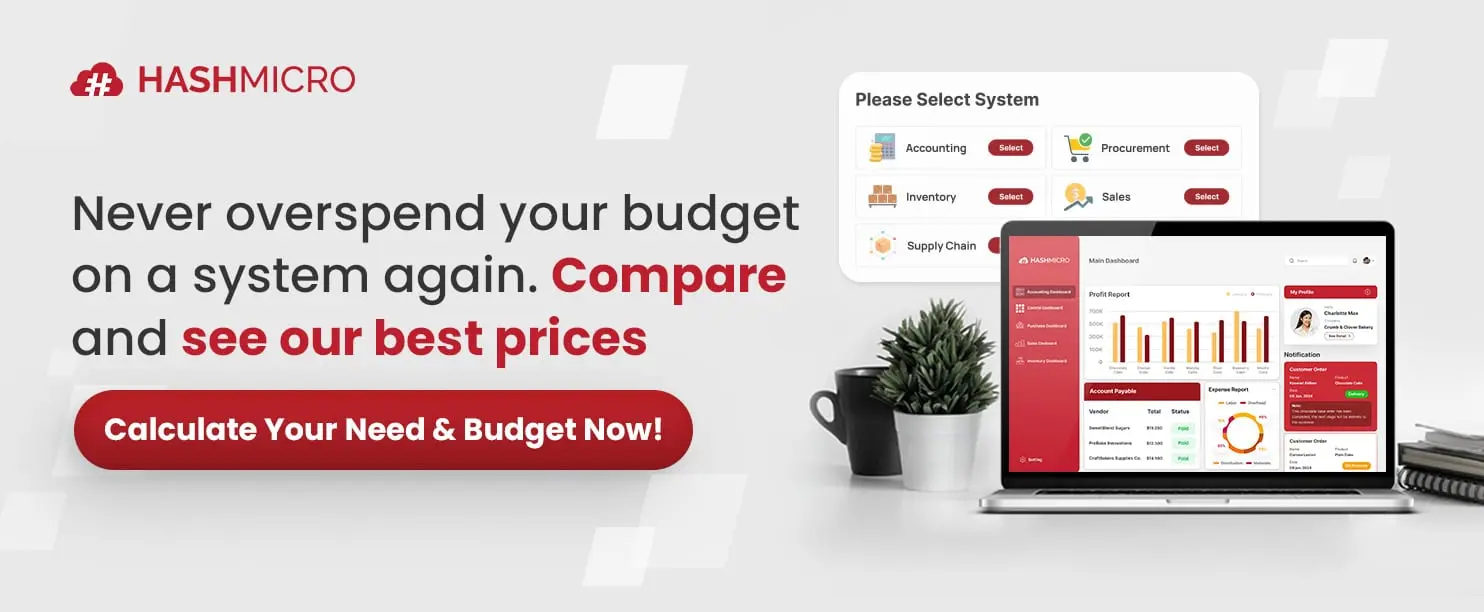As businesses grow in a fast-moving market, many now look for warehousing options that offer flexibility and cost efficiency. On-demand warehouses provide scalable space but also bring risks like fluctuating fees and inconsistent operations. A report from Supply Chain 24/7 notes over 15 percent adoption growth in Malaysia driven by e-commerce.
If your business faces inventory challenges or requires a more agile storage model, learning how on-demand warehousing works can help you choose wisely. This article explains its uses, benefits, and risks to support your decision-making. You will also see how HashMicro WMS optimizes warehouse workflows.

Key Takeaways
|
What is On-Demand Warehousing?
On-demand warehousing is a storage model that lets businesses rent warehouse space only when they need it, offering flexibility that traditional long-term leases cannot provide. It allows companies to pay solely for the capacity they use, helping reduce unnecessary costs while adapting quickly to demand changes.
On-demand warehousing is also a strategic option for improving inventory placement, as businesses gain access to a wide network of warehouse partners. This helps reduce transportation expenses, speed up fulfillment, and support both e-commerce and manufacturing operations seeking greater agility.
Types of Warehouses in Malaysia
In Malaysia, there are several types of warehouses designed to meet diverse business needs. Understanding these options will help you select the ideal storage solution for your business.
- Private Warehouses: Private warehouses are owned and operated by a single company, offering exclusive use of the storage space. This type provides businesses with full control over inventory management and the ability to customize their storage layout, ensuring that it fits their specific operational needs.
- Public Warehouses: Public warehouses are managed by government or semi-government entities and can be rented by multiple companies. They are an affordable option for businesses with fluctuating storage needs, offering flexible storage solutions without long-term commitments, making them ideal for companies seeking scalability.
- Bonded Warehouses: Bonded warehouses are used for storing imported and exported goods, ensuring compliance with Malaysian customs regulations. These facilities provide secure storage, help businesses manage goods in transit, and ensure that all proper taxation protocols are adhered to.
- Co-operative Warehouses: Co-operative warehouses are owned by cooperative societies and are particularly suited for small businesses with limited resources. These shared spaces offer cost-effective storage solutions, enabling companies to leverage pooled resources and achieve reduced operational costs, thereby enhancing their overall efficiency.
- Distribution Centers: Distribution centers are strategically located facilities designed for quick movement of goods to customers. These warehouses are essential for businesses that require fast and efficient order fulfillment, particularly those with high demand for rapid delivery and logistical efficiency.
By exploring these types of warehouses in Malaysia, businesses can select the most suitable solution based on their specific storage needs, budget, and operational objectives. Whether you need an on-demand warehouse space for flexibility or a private solution for exclusive use, there is an ideal option tailored to your business requirements.
What are the Benefits of On-Demand Warehousing in Malaysia?
On-demand warehousing has become a game-changer for businesses in Malaysia, providing a more flexible and cost-efficient solution for storage needs. This innovative model enables businesses to scale storage space according to demand, making it an ideal fit for industries that experience seasonal fluctuations or rapid growth.
Below, we explore some of the key benefits of using on-demand warehousing for your business:
1. Cost efficiency
On-demand warehousing offers significant cost savings for businesses by allowing them to pay only for the space they need at any given time. Unlike traditional warehousing models that require long-term leases and heavy upfront investments, businesses can eliminate unnecessary overhead costs.
This flexible payment structure helps businesses optimize their budgets, ensuring they are only paying for storage space when it is necessary. By reducing fixed operating costs, companies can allocate resources to other critical areas of their operations.
2. Flexible storage space
One of the key benefits of on-demand warehousing is its scalability. Businesses can easily adjust their storage requirements based on seasonal demand or business growth, without the need for long-term commitments.
This flexibility ensures businesses avoid the problem of underutilized or overfilled warehouse spaces, maintaining an efficient inventory management process. Whether experiencing peak season or slower months, businesses can scale their storage needs up or down, providing a smooth and adaptable solution to fluctuating demands.
3. Efficient inventory management
On-demand warehousing solutions integrate advanced warehouse management systems (WMS) and real-time inventory tracking, streamlining inventory management. Businesses can gain complete visibility into their stock levels, ensuring accurate, up-to-date information for order fulfillment.
This enhanced tracking helps minimize stockouts and excess inventory, reducing waste and improving order fulfillment times. By improving inventory management efficiency, businesses can boost operational performance and enhance customer satisfaction.
4. Increased supply chain resilience
On-demand warehousing strengthens the resilience of a business’s supply chain by offering immediate access to additional storage space when needed. This flexibility enables businesses to stay agile and respond quickly to unexpected disruptions, such as natural disasters or unexpected demand spikes.
With the ability to quickly adjust storage capacity, companies can maintain continuity and minimize downtime. On-demand warehouse app solutions empower businesses to stay ahead of potential challenges while ensuring a smoother supply chain flow.
5. Support for flexible scaling
On-demand warehousing is ideal for businesses that require flexible scaling without being locked into long-term contracts or fixed costs. Whether a company needs more space during a peak season or less during slower months, on-demand warehouse providers allow businesses to scale their operations as needed.
This flexibility ensures that businesses can meet their demands without the burden of fixed lease agreements or overcommitment. With scalable warehousing options, companies can adapt to changing market conditions and remain competitive.
By leveraging the advantages of on-demand warehousing, businesses in Malaysia can optimize their storage needs, reduce costs, and enhance operational efficiency. Whether it’s a cost-effective, flexible storage solution or the ability to scale with ease, on-demand warehousing offers the key to success in today’s fast-paced business environment.
How to Choose the Right On-Demand Warehouse
Choosing the right on-demand warehouse in Malaysia involves several key factors that can significantly impact your business operations. Here are the considerations to help guide your decision:
- Location: The location of your on-demand warehouse is critical as it influences transportation costs, delivery times, and overall operational efficiency. Opt for a warehouse situated near major transportation routes and logistics hubs in Malaysia to streamline your supply chain and minimize delays.
- Security: Ensure that the warehouse you choose has robust security measures in place to protect your inventory. Look for warehouses with advanced surveillance systems, access controls, and trained security personnel to safeguard your goods from theft, damage, or unauthorized access.
- Accessibility: The warehouse should be easily accessible for smooth loading and unloading operations. It should have the necessary infrastructure and equipment to facilitate efficient transportation and handling of goods, ensuring fast and seamless order fulfillment.
By considering these factors, you can choose an on-demand warehouse in Malaysia that meets your business needs, supports smooth logistics, and offers the flexibility and security required for growth.
On-Demand Warehousing vs. Traditional Warehousing
On-demand warehousing offers greater flexibility compared to traditional warehousing, particularly in terms of cost and scalability. Traditional warehouses in Malaysia typically require long-term leases and significant upfront infrastructure investments, which can be expensive and rigid for businesses with fluctuating storage needs.
In contrast, on-demand warehousing provides flexible pricing options and eliminates the need for long-term commitments. Businesses can rent storage space as required, avoiding hefty initial costs and only paying for the space they actually use.
Scalability is another key benefit of on-demand warehousing. Unlike traditional warehouses, which require additional infrastructure to expand, on-demand warehouses allow businesses to easily scale their storage up or down based on demand, making them a perfect solution for seasonal or growing businesses.
Challenges and Considerations in Securing an On-Demand Warehouse in Malaysia
When securing an on-demand warehouse in Malaysia, there are several factors to consider beyond the obvious benefits. While this logistics solution offers flexibility, it also comes with challenges that require careful attention to avoid potential disruptions.
Here are some key considerations to keep in mind when choosing the right on-demand warehouse for your business:
- Availability of Warehouse Space: One challenge with on-demand warehousing is that space can be limited, especially during peak seasons or in high-demand areas. It’s essential to plan ahead and secure warehouse space in advance to ensure your business has access to the storage it needs when required.
- Understanding Rental Terms: Thoroughly review the rental agreement of an on-demand warehouse to ensure it aligns with your business needs. Clarify the terms regarding pricing, space allocation, and flexibility to avoid unexpected costs or restrictions that could impact your operations.
- Assessing Provider Reliability: When selecting an on-demand warehouse provider, it’s important to evaluate their reputation and reliability. Choose providers with a proven track record of delivering high-quality service, robust security, and professionalism to ensure smooth operations and dependable service for your business.
- Compatibility with Inventory Systems: Ensure that the on-demand warehouse can seamlessly integrate with your existing inventory management systems. This compatibility ensures efficient tracking and minimizes errors in stock levels, leading to smoother operations and fewer disruptions in your supply chain.
Future Trends in On-Demand Warehousing
The future of on-demand warehousing in Malaysia is being shaped by technological innovations that are transforming the industry. Automation, robotics, and artificial intelligence are streamlining processes, increasing efficiency, and reducing operational costs, making warehouses smarter and more adaptable to business needs.
Sustainability is another growing trend in Malaysia’s warehousing sector. With a focus on reducing carbon footprints, optimizing energy usage, and implementing eco-friendly practices, on-demand warehouses that prioritize sustainability will be increasingly appealing to businesses looking to minimize their environmental impact.
As these trends continue to evolve, the demand for flexible warehouse solutions in Malaysia is expected to rise. On-demand warehouse solutions that incorporate advanced technology and sustainable practices will provide businesses with the agility and cost-effectiveness necessary to remain competitive in the future market.
Optimizing Inventory Management with Hashmicro WMS Solution
In Malaysia, optimizing inventory management is crucial for businesses utilizing on-demand warehousing to stay competitive in a fast-paced market. Warehouse software, such as Hashmicro WMS, is designed to streamline inventory management processes, ensuring that businesses can effectively manage their stock at all times.
One of the standout features of Hashmicro WMS is its real-time inventory tracking capability, offering full visibility into stock levels. This feature enables businesses to make informed decisions, avoid stockouts or overstocking, and ensure a smooth flow of goods, all while maintaining customer satisfaction.
By integrating warehouse software with on-demand warehouses, inventory management reaches new heights, enabling seamless order fulfillment. Below are the key features of HashMicro Warehouse Management Software:
- Inventory Forecasting: By analyzing historical data, trends, and seasonal patterns, inventory forecasting predicts future stock needs, optimizing levels and preventing stockouts and overstocking. This leads to improved operational efficiency and cost savings.
- Goods Management by Category & Storage Method: The system categorizes goods by type, dimensions, and storage methods like FIFO or FEFO, improving tracking accuracy and reducing inventory handling errors, which streamlines procurement.
- Multi-Warehouse & Locations: Managing inventory across multiple warehouses ensures balanced distribution and helps optimize storage space. This feature improves delivery times and smoothens operations, enhancing customer satisfaction.
- Run-Rate Tracking: This feature tracks stock consumption in real time, predicting when to reorder supplies and preventing stockouts. By improving inventory planning, it reduces overstocking and storage costs.
- RFID (Radio Frequenc y Identification): RFID automates item tracking, improving speed and accuracy in warehouse management. It reduces human errors and accelerates inventory handling, boosting operational efficiency.
- Stock Request Management: The system manages internal stock requests across departments, ensuring efficient allocation of inventory and reducing waste and delays in the supply chain.
- Barcode Management: By using barcodes, the system enhances stock accuracy and minimizes errors, preventing discrepancies and optimizing inventory control, ultimately reducing stock-related issues.
- Stock In & Out: Tracking incoming and outgoing stock in real time provides complete oversight of inventory, improving tracking, reducing losses, and streamlining operations.
Hashmicro WMS also automates repetitive tasks, contributing to a more efficient on-demand warehousing operation. With seamless integration with other business systems, it ensures smooth data flow and more effective inventory management, optimizing warehouse operations for Malaysian businesses.
Conclusion
In conclusion, on-demand warehousing provides businesses in Malaysia with a flexible and cost-effective solution for managing their storage needs. With the ability to scale storage space according to demand, companies can optimize their resources and minimize unnecessary overhead costs.
To fully leverage the benefits of on-demand warehousing, HashMicro provides an advanced warehouse management system that integrates seamlessly with flexible warehouse services. HashMicro’s WMS ensures greater operational efficiency, allowing businesses to achieve faster and more reliable logistics, and stay ahead of the competition.
To experience firsthand how HashMicro’s WMS can transform your inventory management and warehousing operations, try our free demo today. See how our scalable warehousing options can help you optimize your business’s storage needs and improve your bottom line.
FAQ about On-Demand Warehouse
-
How does on-demand warehousing affect seasonal businesses?
Seasonal brands benefit because they can scale storage only during peak months without committing to long-term leases. This helps reduce off-season overhead and gives businesses flexibility to adjust warehouse capacity instantly during demand spikes.
-
Can small businesses use on-demand warehousing, or is it only for large companies?
Small businesses can benefit significantly because the model removes the need for major upfront investment. It allows SMEs to access professional warehouse facilities and fulfillment services without long contracts or minimum volume commitments.
-
What types of industries commonly rely on on-demand warehousing?
Aside from e-commerce, industries like cosmetics, electronics, FMCG, and specialty food brands often use on-demand warehousing. These sectors deal with fluctuating demand and product sensitivity, making flexible storage a practical solution.
-
How secure are inventory items in an on-demand warehouse?
Most on-demand warehouse networks provide standardized security measures, including surveillance, controlled access, and digital logs. While the exact level varies, reputable providers follow strict compliance standards to ensure product safety.































